(2020年春)剑桥版五年级英语下册单元知识梳理Starter unit
剑桥(join in)版小学英语五年级下册单元知识梳理总结(全册)

剑桥(join in)版小学英语五年级下册单元知识梳理总结(全册)Start unit: XXXFirst。
let'XXX:Touch: to come into contact with somethingHead: the part of the body above the XXX。
eyes。
nose。
and mouthEnjoy: to take pleasure in somethingNear: close to something or someoneXXX: every personShake hands: to grasp someone's hand and move it up and down as a greetingFun: XXXAlphabet: a XXXNext。
XXX:1.Touch your nose and shake your head.2.e back now.3.Learning can be lots of fun.4.Enjoy your time in class again.5.XXX.6.XXX.7.XXX around.8.Dance with me.Now XXX and friends:We can use the "There be" sentence pattern。
such as "There is" for singular or uncountable nouns。
and "There are" for plural nouns.When introducing a friend。
we can n their age。
birthday。
country of origin。
skills。
hobbies。
daily routine。
etc.Lastly。
(2020年春)剑桥版五年级下册英语教案Starter unit
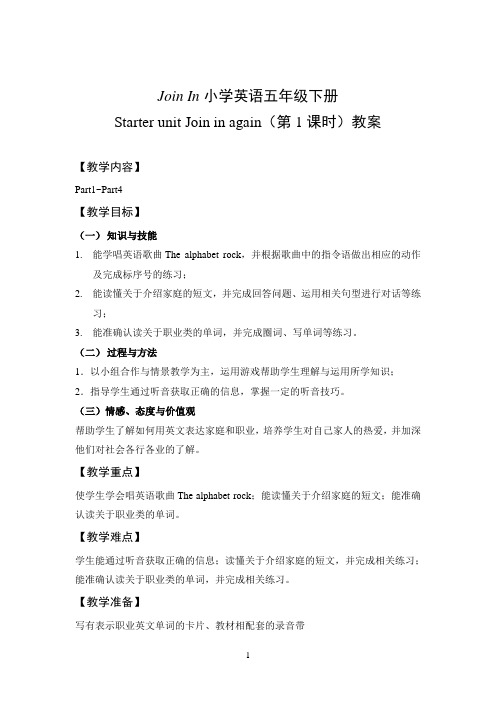
Join In小学英语五年级下册Starter unit Join in again(第1课时)教案【教学内容】Part1~Part4【教学目标】(一)知识与技能1.能学唱英语歌曲The alphabet rock,并根据歌曲中的指令语做出相应的动作及完成标序号的练习;2.能读懂关于介绍家庭的短文,并完成回答问题、运用相关句型进行对话等练习;3.能准确认读关于职业类的单词,并完成圈词、写单词等练习。
(二)过程与方法1.以小组合作与情景教学为主,运用游戏帮助学生理解与运用所学知识;2.指导学生通过听音获取正确的信息,掌握一定的听音技巧。
(三)情感、态度与价值观帮助学生了解如何用英文表达家庭和职业,培养学生对自己家人的热爱,并加深他们对社会各行各业的了解。
【教学重点】使学生学会唱英语歌曲The alphabet rock;能读懂关于介绍家庭的短文;能准确认读关于职业类的单词。
【教学难点】学生能通过听音获取正确的信息;读懂关于介绍家庭的短文,并完成相关练习;能准确认读关于职业类的单词,并完成相关练习。
【教学准备】写有表示职业英文单词的卡片、教材相配套的录音带【教学过程】Step 1 Warming up播放英文歌曲Welcome back,欢迎学生返校,并将学生带入英语学习的氛围。
Step 2 Listen and sing the song.1.学生听歌曲,老师借助体态语帮助学生初步感知和理解歌曲内容,在此基础上归纳和总结出歌名:The alphabet rock,并学说歌名。
2.学生再次听歌曲,在老师体态语提示下进行模仿、跟唱,进一步体验、学习。
3.学生打开课本第2页,第三次听录音,边听边指着书上的歌词学唱歌曲。
4.学生完整演唱歌曲,并配以相应的肢体动作。
5.老师将学生分组,选取2-3组进行表演和展示,并予以评价。
Step 3 Listen, number and read.1.老师引导学生进一步熟悉和巩固1b中的句子。
《Join-In》五年级英语期末复习知识点

Join in五年级下英语期末复习知识要点班级__________ 姓名_________ Starter unit Join in again重点:一、介绍自己的家庭和好朋友1、There be 句型: There is...单数或不可数There are...复数2、介绍朋友可以从年龄:How ol d is he?生日:When is his birthday?来自哪个国家:Where is he from?会什么:What can he d o?喜欢什么: What d oes he love?通常什么时间起床:when does he get up in the morning?什么时间去学校:When d oes he go to school?什么时候开始上课:When d o classes begin?什么时候回家:When does he go home?什么时候睡觉:When does he go to bed?等方面进行描述二、一般现在时:1、概念:一般现在时:表示经常性的事情,经常性的动作或一般性事实。
时间状语:often 经常,usually通常,always 总是,every每个,sometimes 有时,at …在几点钟只有在第三人称单数用动词的“三单变化”,其他用动词的原形。
三单变化:1.多数在动词后+s play — plays like — likes(1)直接在动词词尾加-s.ask---asks work---works get---gets stay---stays(2)以字母s, x, ch, sh或o结尾的动词,在词尾直接加-es.watch---watches wish---wishes fix---fixes d o---d oesgo---goes pass---passes(3)以“辅音字母加- y”结尾的动词,要先变y为i再加-es.try---tries study---studies cry---cries fly---flies2.不规则变化:be---- is are have----has2、一般现在时用法(1)表示经常性,习惯性,永久性的动作或存在的状态.通常与副词sometimes, often, usually, always, every day (year, month ), once (twice, three times) a day,等时间状语连用。
剑桥(join in)版五年级下册英语知识梳理 (1)
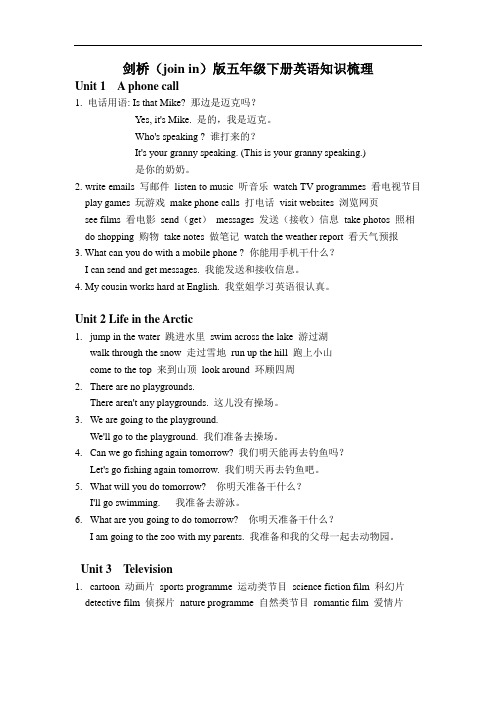
剑桥(join in)版五年级下册英语知识梳理Unit 1 A phone call1. 电话用语: Is that Mike? 那边是迈克吗?Yes, it's Mike. 是的,我是迈克。
Who's speaking ? 谁打来的?It's your granny speaking. (This is your granny speaking.)是你的奶奶。
2. write emails 写邮件listen to music 听音乐watch TV programmes 看电视节目play games 玩游戏make phone calls 打电话visit websites 浏览网页see films 看电影send(get)messages 发送(接收)信息take photos 照相do shopping 购物take notes 做笔记watch the weather report 看天气预报3. What can you do with a mobile phone ? 你能用手机干什么?I can send and get messages. 我能发送和接收信息。
4. My cousin works hard at English. 我堂姐学习英语很认真。
Unit 2 Life in the Arctic1.jump in the water 跳进水里swim across the lake 游过湖walk through the snow 走过雪地run up the hill 跑上小山come to the top 来到山顶look around 环顾四周2.There are no playgrounds.There aren't any playgrounds. 这儿没有操场。
3.We are going to the playground.We'll go to the playground. 我们准备去操场。
剑桥(join in)版英语五年级下册 Starter unit第二课时
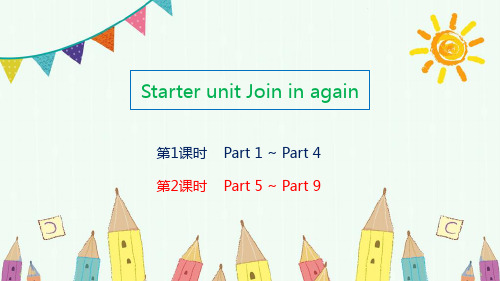
2. Look and fill in the numbers.
Talk about time.
What time is it?
It’s quarter past twelve.
2. Look and fill in the numbers.
Talk about time.
quarter past nine television
6. Match and listen.
Read and match.
3 8 6
5 9 10 4 2 7
6. Match and listen.
Listen and check.
3 8 6
5 9 10 4 2 7
6. Match and listen.
Write the sentences.
He is going to clean his room at nine in the morning. He is going to watch Animal World at ten. He is going to play ping-pong in the afternoon. He is going to Liu Yu’s birthday at seven in the evening.
It’s twenty to seven.
2. Look and fill in the numbers.
Listen and point.
It’s quarter past nine.
2. Look and fill in the numbers.
Listen and point.
It’s quarter to five.
五年级下册一到四单元英语知识点
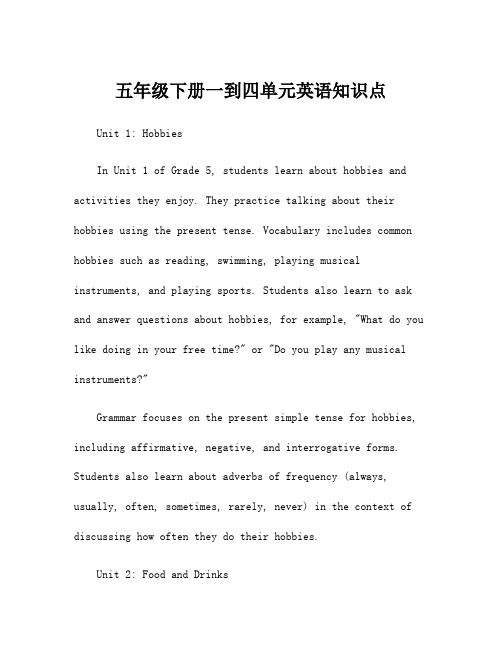
五年级下册一到四单元英语知识点Unit 1: HobbiesIn Unit 1 of Grade 5, students learn about hobbies and activities they enjoy. They practice talking about their hobbies using the present tense. Vocabulary includes common hobbies such as reading, swimming, playing musical instruments, and playing sports. Students also learn to ask and answer questions about hobbies, for example, "What do you like doing in your free time?" or "Do you play any musical instruments?"Grammar focuses on the present simple tense for hobbies, including affirmative, negative, and interrogative forms. Students also learn about adverbs of frequency (always, usually, often, sometimes, rarely, never) in the context of discussing how often they do their hobbies.Unit 2: Food and DrinksUnit 2 introduces vocabulary related to food and drinks. Students learn the names of different types of food items (e.g., fruits, vegetables, meats) and drinks (e.g., juice, water, milk). They practice using countable and uncountable nouns in sentences such as "I like apples" and "She doesn't drink much water."Grammar covers the use of quantifiers (some, any, much, many) and how they are used with countable and uncountable nouns. Students also learn about expressing likes and dislikes for food and drinks using phrases like "I love pizza" or "He doesn't like vegetables."Unit 3: My TownUnit 3 focuses on vocabulary related to describing one's town or city. Students learn the names of places in a town (e.g., school, library, park, hospital) and practice giving directions using prepositions of place (e.g., next to, infront of, between). They also learn to talk about their neighborhoods and what facilities are available.Grammar in this unit includes using there is/are to describe the existence of places and things in a town. Students practice forming sentences like "There is a supermarket near my house" or "There are three parks in my town."Unit 4: WeatherIn Unit 4, students learn vocabulary related to weather and seasons. They study different types of weather conditions (e.g., sunny, cloudy, rainy, windy) and learn about seasonal changes (e.g., spring, summer, autumn, winter). They practice describing the weather in their area using appropriate adjectives and phrases.Grammar focuses on present continuous tense to talk about current weather conditions. Students learn to form sentences like "It's raining right now" or "The sun is shiningbrightly." They also practice asking and answering questions about weather forecasts and making plans based on weather conditions.These units provide a foundation in essential English vocabulary and grammar for Grade 5 students, helping them to communicate effectively about their interests, surroundings, and everyday experiences.。
2020春五年级英语下册知识梳理2剑桥版
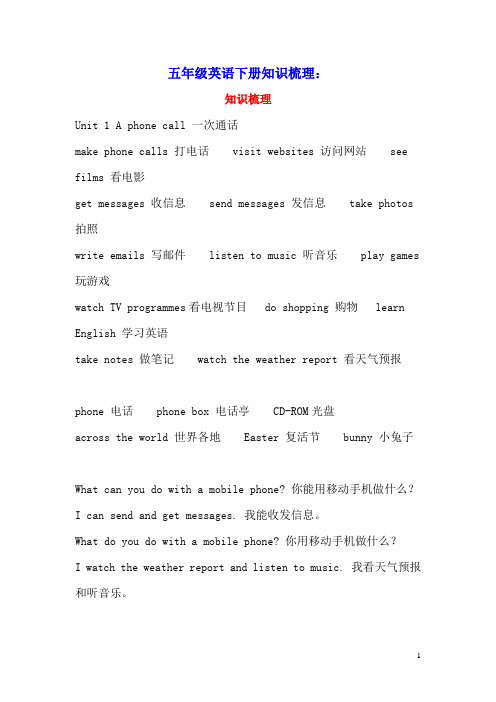
五年级英语下册知识梳理:知识梳理Unit 1 A phone call 一次通话make phone calls 打电话 visit websites 访问网站 see films 看电影get messages 收信息 send messages 发信息 take photos 拍照write emails 写邮件 listen to music 听音乐 play games 玩游戏watch TV programmes看电视节目 do shopping 购物 learn English 学习英语take notes 做笔记 watch the weather report 看天气预报phone 电话 phone box 电话亭 CD-ROM光盘across the world 世界各地 Easter 复活节 bunny 小兔子What can you do with a mobile phone? 你能用移动手机做什么?I can send and get messages. 我能收发信息。
What do you do with a mobile phone? 你用移动手机做什么?I watch the weather report and listen to music. 我看天气预报和听音乐。
Unit 2 Life in the arctic 北极生活the Arctic 北极 North Pole 北极圈 South Pole 南极圈Earth 地球world 世界 ice 冰 everywhere 到处 sea 海 clean 干净的sky 天空 beautiful 漂亮的polar bear 北极熊 arctic fox 北极狐 arctic hare 北极兔seal 海豹snowy owl 雪鹰jump in the water 跳入水中 swim across the lake 游过湖泊walk through the snow 走过雪地 run up the hill 跑上山come to the top 来到山顶 look around 环顾四周There are no playgrounds. = There aren’t any playgrounds.那里没有操场。
(完整版)《Join-In》五年级英语期末复习知识点
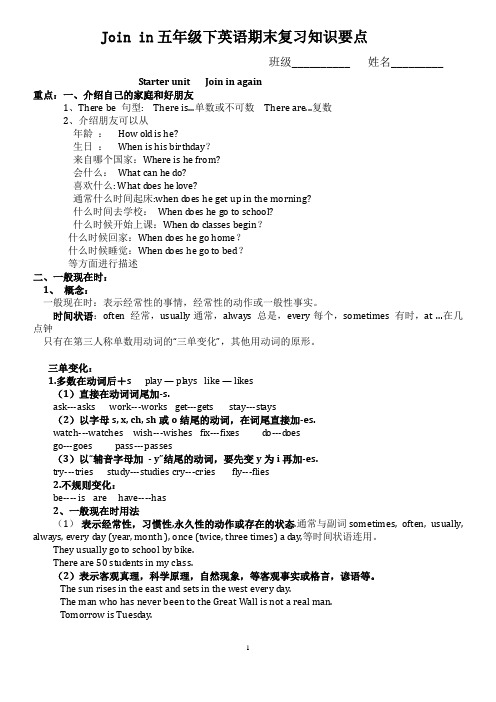
Join in五年级下英语期末复习知识要点班级__________ 姓名_________ Starter unit Join in again重点:一、介绍自己的家庭和好朋友1、There be 句型: There is...单数或不可数There are...复数2、介绍朋友可以从年龄:How ol d is he?生日:When is his birthday?来自哪个国家:Where is he from?会什么:What can he d o?喜欢什么: What d oes he love?通常什么时间起床:when does he get up in the morning?什么时间去学校:When d oes he go to school?什么时候开始上课:When d o classes begin?什么时候回家:When does he go home?什么时候睡觉:When does he go to bed?等方面进行描述二、一般现在时:1、概念:一般现在时:表示经常性的事情,经常性的动作或一般性事实。
时间状语:often 经常,usually通常,always 总是,every每个,sometimes 有时,at …在几点钟只有在第三人称单数用动词的“三单变化”,其他用动词的原形。
三单变化:1.多数在动词后+s play — plays like — likes(1)直接在动词词尾加-s.ask---asks work---works get---gets stay---stays(2)以字母s, x, ch, sh或o结尾的动词,在词尾直接加-es.watch---watches wish---wishes fix---fixes d o---d oesgo---goes pass---passes(3)以“辅音字母加- y”结尾的动词,要先变y为i再加-es.try---tries study---studies cry---cries fly---flies2.不规则变化:be---- is are have----has2、一般现在时用法(1)表示经常性,习惯性,永久性的动作或存在的状态.通常与副词sometimes, often, usually, always, every day (year, month ), once (twice, three times) a day,等时间状语连用。
五年级下学期单元知识点Starter unit Join in again
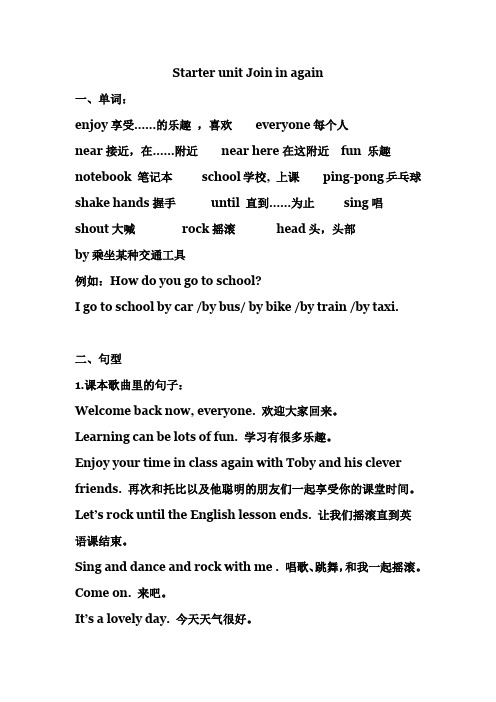
Starter unit Join in again一、单词:enjoy享受……的乐趣,喜欢everyone每个人near接近,在……附近near here在这附近fun 乐趣notebook 笔记本school学校, 上课ping-pong乒乓球shake hands握手until 直到……为止sing唱shout大喊rock摇滚head头,头部by乘坐某种交通工具例如:How do you go to school?I go to school by car /by bus/ by bike /by train /by taxi.二、句型1.课本歌曲里的句子:Welcome back now, everyone. 欢迎大家回来。
Learning can be lots of fun. 学习有很多乐趣。
Enjoy your time in class again with Toby and his clever friends. 再次和托比以及他聪明的朋友们一起享受你的课堂时间。
Let’s rock until the English lesson ends. 让我们摇滚直到英语课结束。
Sing and dance and rock with me . 唱歌、跳舞,和我一起摇滚。
Come on. 来吧。
It’s a lovely day. 今天天气很好。
Join in again. 再次加入。
Clap your hand and rock with me. 拍拍你的手,和我一起摇滚。
Touch your nose and shake your head. 触摸你的鼻子,摇晃你的头。
Turn around. 转身。
2.指令:Touch your nose. 摸摸你的鼻子。
Clap your hands. 拍拍你的手。
Turn around. 转身。
Touch your hair. 摸摸你的头发。
2020春五年级英语下册Starterunit单元知识梳理剑桥版

Start unit Join in again二、背诵句型1 Touch your nose and shake your head.触摸你的鼻子,摇摇你的头。
2 Welcome back now. 欢迎回来。
3 Learning can be lots of fun. 学习充满乐趣。
4 Enjoy your time in class again. 很高兴再次回到课堂。
5 Sing and dance and rock with me. 跟我来唱跳摇滚吧。
6 Shake hands with your partner. 和你的同伴摇摇手。
7 Turn around. 转圈。
8 Dance with me. 跟我跳舞。
重点:一、介绍自己的家庭和好朋友书P3 1、There be 句型: There is...单数或不可数 There are...复数2、介绍朋友可以从年龄: How old is he?生日: When is his birthday?来自哪个国家:Where is he from?会什么: What can he do?喜欢什么: What does he love?通常什么时间起床:when does he get up in the morning?什么时间去学校: When does he go to school?什么时候开始上课:When do classes begin?什么时候回家:When does he go home?什么时候睡觉:When does he go to bed?等方面进行描述二、一般现在时:1、概念:一般现在时:表示经常性的事情,经常性的动作或一般性事实。
时间状语:often 经常,usually通常,always 总是,every每个,sometimes 有时,at …在几点钟只有在第三人称单数用动词的“三单变化”,其他用动词的原形。
三单变化:1.多数在动词后+s play — plays like — likes(1)直接在动词词尾加-s.ask---asks work---works get---gets stay---stays(2)以字母s, x, ch, sh或o结尾的动词,在词尾直接加-es.watch---watches wish---wishes fix---fixes do---doesgo---goes pass---passes(3)以“辅音字母加 - y”结尾的动词,要先变y为i再加-es.try---tries study---studies cry---cries fly---flies2.不规则变化:be---- is are have----has2、一般现在时用法(1)表示经常性,习惯性,永久性的动作或存在的状态.通常与副词sometimes, often, usually, always, every day (year, month ), once (twice, three times) a day,等时间状语连用。
剑桥(join in)版英语五年级下册Starter unit(5~9)
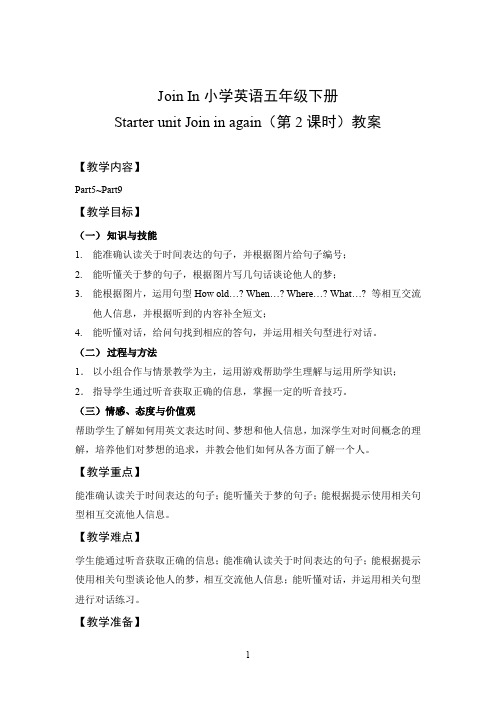
Join In小学英语五年级下册Starter unit Join in again(第2课时)教案【教学内容】Part5~Part9【教学目标】(一)知识与技能1.能准确认读关于时间表达的句子,并根据图片给句子编号;2.能听懂关于梦的句子,根据图片写几句话谈论他人的梦;3.能根据图片,运用句型How old…? When…? Where…? What…? 等相互交流他人信息,并根据听到的内容补全短文;4.能听懂对话,给问句找到相应的答句,并运用相关句型进行对话。
(二)过程与方法1.以小组合作与情景教学为主,运用游戏帮助学生理解与运用所学知识;2.指导学生通过听音获取正确的信息,掌握一定的听音技巧。
(三)情感、态度与价值观帮助学生了解如何用英文表达时间、梦想和他人信息,加深学生对时间概念的理解,培养他们对梦想的追求,并教会他们如何从各方面了解一个人。
【教学重点】能准确认读关于时间表达的句子;能听懂关于梦的句子;能根据提示使用相关句型相互交流他人信息。
【教学难点】学生能通过听音获取正确的信息;能准确认读关于时间表达的句子;能根据提示使用相关句型谈论他人的梦,相互交流他人信息;能听懂对话,并运用相关句型进行对话练习。
【教学准备】画有不同时间的图片、教材相配套的录音带【教学过程】Step 1 Warming up播放关于时间的英文视频,提示学生本节课要复习关于时间的内容的同时,将学生带入英语学习准备状态。
Step 2 Look and fill in the numbers.1.老师利用图片帮助学生复习关于时间的表达法,如:What time is it? It’s…o’clock/ half past…/ quarter past…/ … past …/ … to …等。
2.学生打开课本第4页,在老师的指导下,进一步复习和巩固关于时间的表达。
如:老师说时间,学生指出书上对应的图片。
3.学生独立完成书上看图、读句子、填数字的练习,老师巡视指导。
五年级下册英语单元知识梳理-Unit 1 A phone call Join in外研剑桥版

Unit 1 A phone call一、重点词汇1.背写词汇work 工作;运转like 喜欢collect 收集read 读mobile phone 手机call 一次通话2.熟读词汇ask 问paint 颜料Easter 复活节Easter Bunny 复活节兔子CD-ROM 只读光盘programme 节目something 某物;某事squirrel 松鼠storybook 故事书get 收到ill 有病的wrong 有问题的Arctic animals 北极动物first 首先use 使用二、背诵短语make phone calls 打电话play games 玩游戏across the world 全世界send and get messages 收发信息learn English 学英语phone box 电话亭watch the weather report 看天气预报take notes 作笔记wait a moment 等一下listen to music 听音乐take photos 拍照over there 那儿visit websites 浏览网站do shopping 购物have to 必须watch TV programmes 看电视节目see films 看电影of course 当然write emails 写邮件hurry up 快点三、背诵句子1. See you tomorrow. 明天见。
2. I’ve got a new CD-ROM. 我有一个新光盘。
3. Can you come to my place? 你们能来我家吗?4. Phone your mum and your grandma. 给你们的妈妈和奶奶打电话。
5. What can I do? 我能做什么?6. Mobile phones are very popular across the world. 手机在全世界非常受欢迎。
2020春五年级英语下册知识梳理1剑桥版
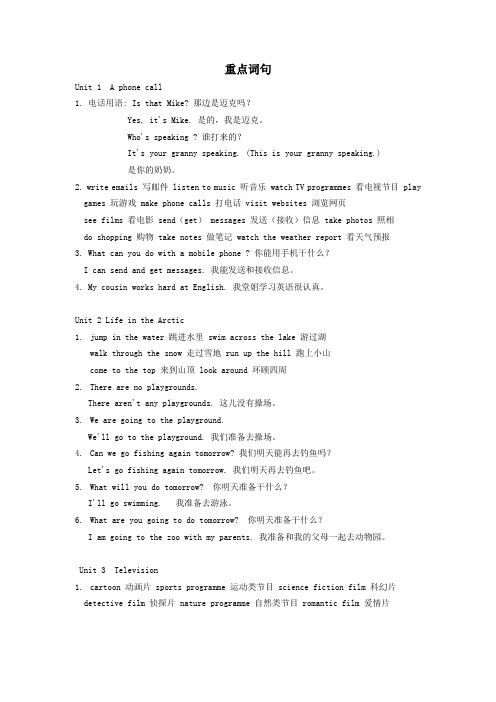
重点词句Unit 1 A phone call1. 电话用语: Is that Mike? 那边是迈克吗?Yes, it's Mike. 是的,我是迈克。
Who's speaking ? 谁打来的?It's your granny speaking. (This is your granny speaking.)是你的奶奶。
2. write emails 写邮件 listen to music 听音乐 watch TV programmes 看电视节目 play games 玩游戏 make phone calls 打电话 visit websites 浏览网页see films 看电影 send(get) messages 发送(接收)信息 take photos 照相do shopping 购物 take notes 做笔记 watch the weather report 看天气预报3. What can you do with a mobile phone ? 你能用手机干什么?I can send and get messages. 我能发送和接收信息。
4. My cousin works hard at English. 我堂姐学习英语很认真。
Unit 2 Life in the Arctic1.jump in the water 跳进水里 swim across the lake 游过湖walk through the snow 走过雪地 run up the hill 跑上小山come to the top 来到山顶 look around 环顾四周2.There are no playgrounds.There aren't any playgrounds. 这儿没有操场。
3.We are going to the playground.We'll go to the playground. 我们准备去操场。
- 1、下载文档前请自行甄别文档内容的完整性,平台不提供额外的编辑、内容补充、找答案等附加服务。
- 2、"仅部分预览"的文档,不可在线预览部分如存在完整性等问题,可反馈申请退款(可完整预览的文档不适用该条件!)。
- 3、如文档侵犯您的权益,请联系客服反馈,我们会尽快为您处理(人工客服工作时间:9:00-18:30)。
Start unit Join in again
一、熟读词汇
二、背诵句型
1 Touch your nose and shake your head. 触摸你的鼻子,摇摇你的头。
2 Welcome back now. 欢迎回来。
3 Learning can be lots of fun. 学习充满乐趣。
4 Enjoy your time in class again. 很高兴再次回到课堂。
5 Sing and dance and rock with me. 跟我来唱跳摇滚吧。
6 Shake hands with your partner. 和你的同伴摇摇手。
7 Turn around. 转圈。
8 Dance with me. 跟我跳舞。
重点:一、介绍自己的家庭和好朋友
书P3 1、There be 句型: There is...单数或不可数There are...复数
2、介绍朋友可以从
年龄:How old is he?
生日:When is his birthday?
来自哪个国家:Where is he from?
会什么:What can he do?
喜欢什么: What does he love?
通常什么时间起床:when does he get up in the morning?
什么时间去学校:When does he go to school?
什么时候开始上课:When do classes begin?
什么时候回家:When does he go home?
什么时候睡觉:When does he go to bed?
等方面进行描述
二、一般现在时:
1、概念:
一般现在时:表示经常性的事情,经常性的动作或一般性事实。
时间状语:often 经常,usually通常,always 总是,every每个,sometimes 有时,at …在几点钟
只有在第三人称单数用动词的“三单变化”,其他用动词的原形。
三单变化:
1.多数在动词后+s play — plays like — likes
(1)直接在动词词尾加-s.
ask---asks work---works get---gets stay---stays
(2)以字母s, x, ch, sh或o结尾的动词,在词尾直接加-es.
watch---watches wish---wishes fix---fixes do---does
go---goes pass---passes
(3)以“辅音字母加- y”结尾的动词,要先变y为i再加-es.
try---tries study---studies cry---cries fly---flies
2.不规则变化:
be---- is are have----has
2、一般现在时用法
(1)表示经常性,习惯性,永久性的动作或存在的状态.通常与副词sometimes, often, usually, always, every day (year, month ), once (twice, three times) a day,等时间状语连用。
They usually go to school by bike.
There are 50 students in my class.
(2)表示客观真理,科学原理,自然现象,等客观事实或格言,谚语等。
The sun rises in the east and sets in the west every day.
The man who has never been to the Great Wall is not a real man.
Tomorrow is Tuesday.
3、一般现在时的句子转换:
(1)当句子中有be动词或情态动词时,则把be动词或情态动词(can,could等等)提到主语的前面变成疑问句;在be动词或情态动词后面加not变成否定句.
例:①陈述句:She is a student.
疑问句→ Is she a student?
否定句→ She is not a s tudent.
②陈述句:I can swim.
疑问句→ Can you swim
否定句→ I can not swim.
(2)当句子中即没有be动词,也没有情态动词时,则在主语前加助动词do (you,以及复数), does(单数she,he,it)变成问句;在主语后谓语动词前加助动词don’t(I,you,以及复数), doesn’t(单数she,he,it)变成否定句,助动词后的动词要变成动词原形。
例:①陈述句:We get up at 7:00 every morning.
疑问句→Do you get up at 7:00 every morning?
否定句→We don’t get up at 7:00 every morning.
②陈述句:She has a little brother.
疑问句→ Does she have a little brother?
否定句→ She doesn’t have a little brother.。
